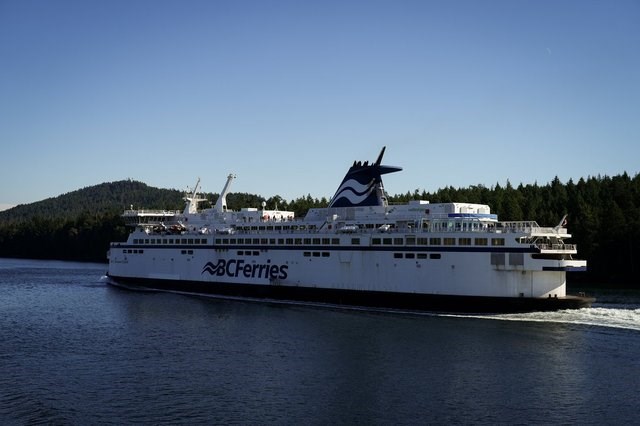
The BC Ferries vessel Spirit of Vancouver Island passes between Mayne Island and Galiano Island while travelling from Swartz Bay to Tsawwassen, B.C., on Wednesday, Sept. 20, 2023. THE CANADIAN PRESS/Darryl Dyck
Republished March 31, 2025 - 4:04 PM
Original Publication Date March 31, 2025 - 3:26 PM
BC Ferries' chief executive said Monday he is "at odds" with a regulator's decision to approve four new vessels instead of the five it had requested, calling it "a missed opportunity" to ensure reliable service in the future.
Nicolas Jimenez said BC Ferries was "disappointed" with the decision by the BC Ferry Commission, and he expected shipbuilding costs and demand to continue to grow.
"Our customers have been clear — they need more sailing capacity, fewer delays, and a ferry system that keeps up with demand in the coming years," Jimenez said in a statement on Monday.
"While four vessels will still provide some much-needed benefits, we believe we’re missing a critical opportunity to build a more resilient transportation network for the future at a lower price now."
The commission, which has independent oversight of the ferry operator, said in its decision that spending on a fifth ferry "is not in the public interest" as it is "not essential for safe and reliable service and is not fiscally prudent."
BC Ferries plans to retire four aging vessels and had hoped to boost its fleet to 12, but instead the commission's ruling means the fleet will be maintained at 11 ships.
While the cost of the project hasn't been finalized, commission approval was required because it would exceed $50 million.
The commission said in its decision that the four new diesel-electric ferries would resolve many of the issues cited by BC Ferries in requesting a fifth vessel.
“The commissioner agrees that a relief vessel would improve resiliency, provide maintenance flexibility and reduce the risk of lengthy service disruptions,” the decision said.
“Nonetheless, the Commissioner expects mechanical reliability to improve significantly, and the risk of lengthy service disruptions to be reduced, compared to today’s situation as the oldest four vessels in the major fleet are replaced.”
BC Ferries said it is expected that the builders of the new ferries will be selected by early summer. It hopes the first vessel can come into service in the 2030 fiscal year, then at six-month intervals after that.
The oldest ferry being replaced is the Queen of New Westminster, built in 1964, while the Queen of Cowichan, Queen of Alberni and Queen of Coquitlam all turn 50 next year.
Jimenez said the proposal for five new vessels was "the strongest possible case" to boost capacity and resiliency "at the most affordable price."
He said a fifth vessel will eventually be needed and will get "substantially more expensive" if not built in the current process that would have allowed savings due to "economies of scale."
But the commission’s decision took issue with BC Ferries’ forecast of increased demand on the Tsawassen-Victoria route that would require a fifth ferry.
“Given BC Ferries’ current financial situation, the commissioner is of the opinion that future fare increases will most likely be higher than inflation to contribute toward the cost of the (new ferries) and will have a dampening effect on demand,” the decision said.
The company also said in its release that fare increases should not be an issue, given that the company "can finance the five vessels with no impact on fares until at least 2028."
"Further, the incremental cost of procuring a fifth ship on a fixed-price basis now relative to the broader system funding gaps is fractionally very small," BC Ferries said.
B.C. Premier David Eby said at an unrelated news conference on Monday that the commissioner was independent and the government would look at the decision to make sure it “benefits all British Columbians.”
He said four new boats "will assist with stability in the fleet."
This report by The Canadian Press was first published March 31, 2025.
News from © The Canadian Press, 2025